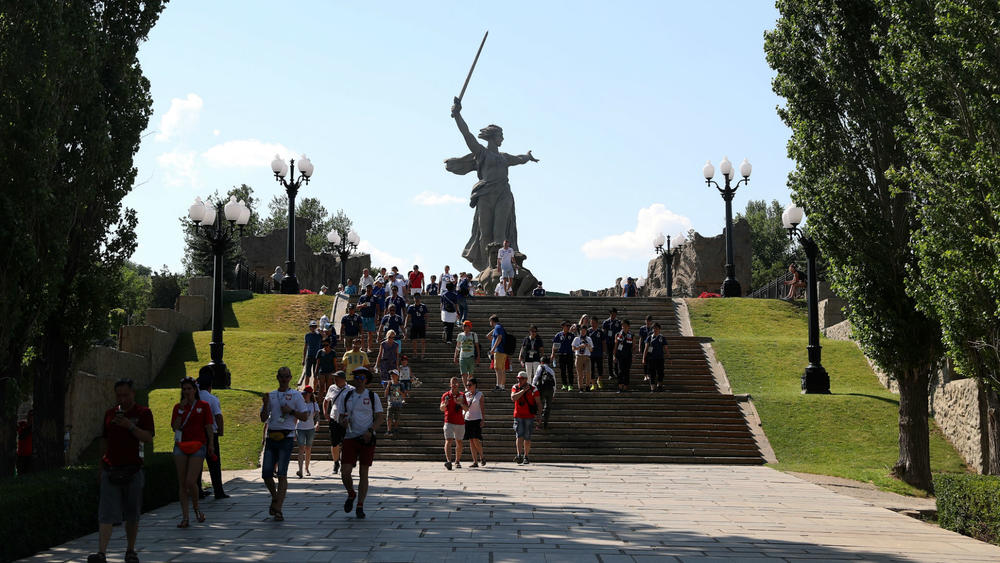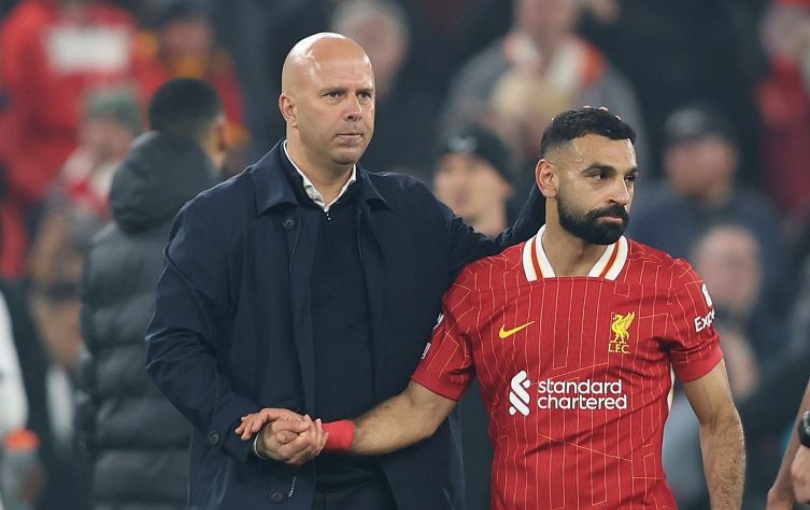From ruins to World Cup, football's healing power still at work in Volgograd
Just over 75 years after a game was played in the shattered remains of Stalingrad, the World Cup soothed scars on the banks of the Volga.

"Some people believe football is a matter of life and death. I am very disappointed with that attitude. I can assure you it is much, much more important than that."
Is it? No, of course not. And yet, yes. Perhaps it is.
Bill Shankly's famous remark about the meaning of the beautiful game, surely not intended to be taken entirely seriously, has rarely appeared more challenging than in the geographical setting of an otherwise forgettable 1-0 win for Poland over Japan.
A narrow victory for an eliminated team, who, courtesy of results elsewhere, failed to prevent the opposition from progressing to the round of 16, is not the stuff of an all-time classic.
But for at least some of those who travelled to Volgograd to witness the final match of the city's World Cup hosting duties, this unremarkable fixture offered a glimpse of the reconciliatory and unifying power of football.
Decades before Shankly offered his pithy phrase, the future Liverpool manger served as ground crew in the RAF during the Second World War.
As conflict raged across Europe, North Africa, the Middle East and Asia, one city - both its civilian population and the soldiers stationed there - endured unparalleled suffering and hardship.
Get FourFourTwo Newsletter
The best features, fun and footballing quizzes, straight to your inbox every week.
After being heavily bombed by the Luftwaffe, Stalingrad, a model centre of industry on the banks of the Volga, was fought over bitterly by the Wehrmacht and the Red Army from July 17, 1942 to February 2, 1943, when the remains of the German Sixth Army surrendered after being cut off and encircled by a Soviet counter-offensive.
Just three months later, Dynamo Stalingrad and Spartak Moscow played "the match in the ruins", a morale-boosting fixture held at the Azot Stadium, one of the only sporting venues to escape the destruction that reduced much of the city to rubble.
A Dinamo team featuring some players from Traktor Stalingrad who had fought in the defence of the city won 1-0. June 30, 2018
Few of the estimated crowd of 9,000 present at that game could imagine, 75 years and one month on, the gleaming new Volgograd Arena, boasting a capacity of 45,000, witnessing Jan Bednarek score the winner for Adam Nawalka's team against a lacklustre Samurai Blue.
Coincidentally, this was a game between an ally of the Nazis, engaged in its own pitiless war in the Pacific, and Poland, a country that suffered more than almost any other during those dark years.
The venue for such a symbolically powerful contest may be one of the newest and most eye-catching structures in the area, but the new home of Rotor Volgograd will forever find itself in the shadow of a neighbouring spectacle, the impact of which cannot be measured in mere numbers of seats, pitch dimensions or goals scored.
Adjacent to the stadium and rising above it, the memorial ensemble "Heroes of the Battle of Stalingrad" is a remarkable collection of statues strategically positioned along the climb up Mamayev Kurgan, the highest hill in the city, offering commanding views of the surrounding area and across the Volga.
Unmistakably a product of high Soviet grandeur, the war memorial atop Mamayev Kurgan is extraordinary in its visual power, and deeply moving June 28, 2018
Here, 200 steps, one for each day of the battle, leads awe-struck visitors up to The Motherlands Calls, the extraordinary centrepiece at the summit of the hill.
A masterpiece of both sculpture and structural engineering that towers 85 metres from plinth to the tip of its raised sword, the statue dares all who look upon it to remain unmoved as it urges patriotic Russians to come to the defence of the nation.
In 1983, 40 years after the game that defied the bloodshed and misery of the war still raging throughout the country, the players who participated in the match between Dynamo and Spartak returned to the city for a poignant reunion at the memorial.
40 years later, in 1983, the players held a reunion at the war memorial. June 30, 2018
This month, others took the opportunity presented by the World Cup - long a harmonising force crossing cultural and political boundaries impenetrable by other means - to pay their respects to the city's tragic past.
Among them was Thomas Miller, a psychiatrist from Nuremburg who has a Stuttgart season ticket and has been to every World Cup since 1990.
His uncle Egon Miller fought at Stalingrad and, after being wounded, was evacuated on one of the last hospital trains to leave the city before counter-attacking Soviet forces sprung their decisive trap.
Egon returned to duty on the Eastern front and was captured, spending five years as a prisoner of war. Thomas, having double checked with his cousin, was quite clear on one point in particular - Egon never spoke badly of his treatment at the hands of his Russian captors, despite the terrible toll Adolf Hitler's war had taken on the country.
And considering the trepidation held by some in the West before the tournament, a similarly glowing review, albeit in far lighter circumstances, was offered by his nephew: This World Cup has been a logistical and cultural triumph so far in the estimation of Thomas, who remarked upon the sweeping changes undergone in Russia since his last visit in the late 1980s, shortly before the fall of the Berlin Wall.
Shared a compartment back from Volgograd with Thomas, a psychiatrist who lives in Nuremberg.His uncle was wounded in Stalingrad and left onboard one of the last trains to depart the city before the Red Army’s offensive encircled the German forces June 29, 2018
Dr Miller's dry wit also offered an indication of the healing power of time combined with that eternal balm for the human soul, sport.
Having arrived in the city on Wednesday and caught South Korea's shock victory over the holders on television, Thomas, somewhat sheepishly, remarked on the irony of the location in which he witnessed the spectacular demise of Die Mannschaft's campaign in Russia.
Earlier, when arranging the journey, he told the travel agency specialising in Russian trains that it was "nice for a German to be able to book a return ticket to Stalingrad". In reply, they hoped he would have the best trip ever.
Unknown challenges and unwanted causes of division may lie ahead, but for this month at least, all was well in Volgograd, thanks to patience, forgiveness and football.
